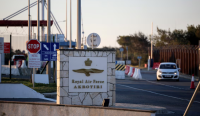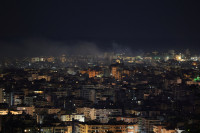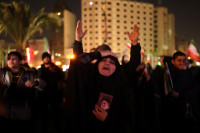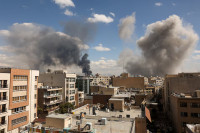World
Europe talks up more defence spending as Ukraine peacekeeper plan divides
Leaders call for higher defence budgets but remain split on deploying troops to Ukraine.
Reuters
European leaders meeting in Paris for emergency talks on Monday called for increased defence spending to strengthen the continent’s military capabilities but remained divided over deploying peacekeepers to Ukraine as part of a potential peace deal.
The leaders also agreed that concluding a Ukraine ceasefire without a comprehensive peace agreement would be risky and that they were prepared to offer security guarantees to Ukraine “depending on the level of American support,” a European official said.
“We agree with President Trump on a ‘peace through strength’ approach,” the official added, speaking on condition of anonymity.
The Paris meeting was convened by French President Emmanuel Macron after US President Donald Trump arranged bilateral peace talks with Russia, excluding European allies and Ukraine. These negotiations are set to begin in Saudi Arabia on Tuesday.
Macron spoke with Trump ahead of the meetings, officials from both countries said on Monday. A White House official described it as “a friendly call” during which they discussed the Paris meeting and the talks in Saudi Arabia.
Ukrainian President Volodymyr Zelenskiy also said he had a “long” call with Macron on security guarantees.
“We share a common vision: security guarantees must be robust and reliable,” Zelenskiy said on X, adding, “Any other decision without such guarantees—such as a fragile ceasefire—would only serve as another deception by Russia and a prelude to a new Russian war against Ukraine or other European nations.”
Trump surprised Ukraine and European allies last week by announcing that he had called Russian President Vladimir Putin—who has long been isolated by the West—to discuss ending the war without prior consultation with them. European nations now face the reality of a future with reduced US protection.
The US decision has prompted a recognition among European nations that they must do more to ensure Ukraine’s security.
British Prime Minister Keir Starmer, who had earlier indicated willingness to send peacekeeping troops to Ukraine, said on Monday that any deployment would require a US security commitment. He added that it was too soon to determine how many British troops could be sent.
A peacekeeping force would not only heighten the risk of direct confrontation with Russia, which launched its full-scale invasion of Ukraine in 2022, but also strain European armies already depleted by years of supplying Ukraine and a long period of relative peace.
Questions also remain over how some European nations—many of which are struggling with public finances—would fund such expanded military commitments.
Keith Kellogg, Trump’s Ukraine envoy, said he would visit Ukraine from Wednesday. When asked whether the US would provide a security guarantee for any European peacekeepers, he responded, “I’ve been with President Trump, and the policy has always been: You take no options off the table.”
Defencespending
Starmer’s push for peacekeepers appeared to create a divide among leaders in Paris, which included German Chancellor Olaf Scholz, and the prime ministers of Italy, Poland, and Spain—Giorgia Meloni, Donald Tusk, and Pedro Sanchez.
Scholz said there could be no peace deal without Ukraine’s consent but dismissed talk of a German peacekeeping mission in Ukraine as “highly inappropriate” without a peace agreement in place.
Both he and Tusk, however, supported loosening strict EU fiscal rules to allow for greater defence spending without violating the bloc’s deficit regulations.
Meloni also expressed scepticism about the peacekeeping proposal, according to sources in her office.
“It was useful to discuss today the various hypotheses on the table. The one that foresees the deployment of European soldiers in Ukraine seems to me to be the most complex and perhaps the least effective, and on this too I voiced Italy’s doubts,” she said.
Danish Prime Minister Mette Frederiksen said she was open to discussing troop deployments and that Europe must enhance its support for Ukraine while boosting its own defence spending.
“Russia is threatening all of Europe now, unfortunately,” she told reporters.
USand Russia to meet in Saudi Arabia
Senior US and Russian officials are set to meet in Saudi Arabia on Tuesday for the highest-level in-person discussions between the two nations in years, ahead of a planned meeting between Trump and Putin.
Saudi Crown Prince Mohammed bin Salman met on Monday with US Secretary of State Marco Rubio, US National Security Adviser Mike Waltz, and Middle East envoy Steve Witkoff, who are part of the US negotiating team.
On the Russian side, Foreign Minister Sergei Lavrov and Kremlin foreign policy adviser Yuri Ushakov are expected to participate, according to the Kremlin.
However, signs of differing approaches emerged.
Rubio’s spokesperson Tammy Bruce said the discussions would assess whether Russia was serious about peace talks and whether a first step towards an agreement was possible.
The Kremlin, meanwhile, said the talks would focus on “restoring the entire complex of Russian-American relations” and ruled out making territorial concessions.
On arrival in Riyadh, Ushakov told Russia’s RIA state news agency that discussions on Ukraine would remain strictly bilateral.
“We came to negotiate with American colleagues,” RIA quoted Ushakov as saying. “There can be no trilateral talks in Riyadh.”
Russia’s sovereign wealth fund chief, Kirill Dmitriev, is also scheduled to meet a US delegation in Saudi Arabia on Tuesday to discuss strengthening ties and boosting economic cooperation, a source in Riyadh said.
CNN quoted Dmitriev as saying he had already met several members of Trump’s team in Riyadh and described Trump and his advisers as “great problem-solvers.”
“I think the promise is: let’s have dialogue, let’s figure out the best solution for our countries, for other countries, for the global community,” he was quoted as saying.
Dmitriev denied that Russia’s primary goal was to ease sanctions, according to CNN, and argued that both the US and Russian economies could benefit from closer collaboration.
“I think it’s very important to build bridges. I think US-Russia relations are very important for the world,” he said.




 14.24°C Kathmandu
14.24°C Kathmandu














